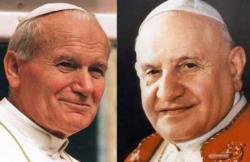 Next Sunday, Pope Francis will canonize two very different popes, John XXII and John Paul II. It is a politically astute move since elevating one or the other could have been seen as “victory” for the followers of one over the other. The two popes were very different men who left behind vastly different legacies.
Next Sunday, Pope Francis will canonize two very different popes, John XXII and John Paul II. It is a politically astute move since elevating one or the other could have been seen as “victory” for the followers of one over the other. The two popes were very different men who left behind vastly different legacies.
Those who know me know, of the two camps, I fall in behind John XXIII. He was the pope who called the Second Vatican Council to open the windows of the Church letting fresh air swirl around as I was coming of age in a Catholic family and elementary school. The changes begun by VCII went beyond moving from Latin into vernacular in the Mass or increased lay participation in the same. The council engaged the Roman Catholic Church with the modern world and produced documents that influenced the course of the Roman Catholic Church for decades. Still do. But could do more…
John XXIII is remembered as the “good pope,” the one who walked the streets of Rome to meet the people, who was the pastor rather than theologian. (His studies were in Church History.)
John Paul II was also a man of great influenced not only on the Church but also on the world once he moved onto its stage. He is often credited with playing a large part in bringing down the Communist regime in Eastern Europe. He reached out to people of other faiths, praying in a mosque and at the West Wall in Jerusalem. He called together leaders of many faiths to pray for peace at Assisi. And he reached out to the young Catholics with his charismatic ways.
On the home front, however, he was, as John L. Allen Jr. said on the occasion of JPII’s death, a pope who “leaves behind the irony of a world more united because of his life and legacy, and a church more divided.” (See NCR editorial “New Papal saints have flaws as well as greatness.”) Some will say the divisions began with VCII.
Naming these two different men “saints” does not make them so, but simply expresses the Church’s conviction that indeed they are enjoying eternal life with the God they gave their lives to serve. It also holds them up as role models for those of us still on our way. This is where my unease enters. Holy people are not required to hold the same political beliefs. They do not have to share the same vision for the direction the Church should go. They are people with histories and experiences that shaped them. They are not perfect. It is not JPII’s vision of the Church, more conservative than my own, that gives me pause. It is his handling the sexual abuse of children and the protection of hierarchy who shielded pedophiles in their dioceses. His calling Cardinal Law to be archpriest of a major basilica in Rome after he resigned in disgrace as archbishop of Boston was devastating. At least to me and to many others outraged by the ability of bishops to transfer known pedophiles from parish to parish or across the country.
We all have faults and need God’s Grace and mercy. I’m not saying I don’t think JPII is a saint as Maureen Dowd says in today’s New York Times op-ed. I am saying the time isn’t right. I’m not comfortable with holding him up as a role model when the RCC has yet to deal with the role of hierarchy in the sex abuse scandal in a way that holds them accountable. I hope Pope Francis will address this issue. Until someone does, the healing cannot be complete.
Many if not most will disagree with me, I suppose, and the canonization will go forward, and life will go on. So will the Church’s struggle to come to grips with the scope of the abuse and the depth of anguish left in its wake. And with the clericalism that allowed it to continue for decades.

Speak Your Mind